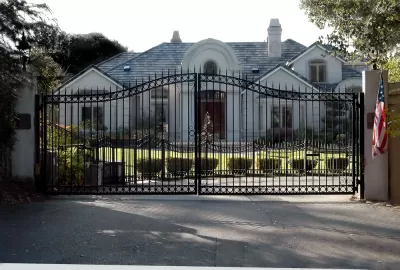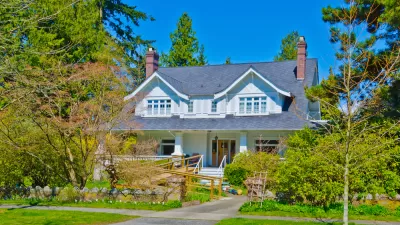"And you know why they made the new twenties? Cause I got all the old ones."

Inequity in the United States continues to grow, and that inequity is increasingly generational. Older Americans own the lion's share of homes and properties, and as the value of these properties increases, so does the wealth gap.
Politicians talk a fair amount about income inequality, but wealth inequality, which includes not just wages but also the value of properties and investments, paints a starker picture of further inequality. Over the past few decades that inequity has become increasingly a difference between the old and young. "Since 1989, all of the net increase in wealth has been experienced by households now aged 65 and older. The wealth of those aged 55 to 64 is essentially the same is in 1989 (up just 3 percent); those under 55 are decidedly poorer; the average wealth of those 35 to 44 is 43 percent less than in 1989, and for those 45 to 54, is 33 percent less than in 1989," Joe Cortright writes for CityObservatory.
A lot of this disparity is driven by the value of homes, because a home is the largest asset that many households have. As the value of homes went up, it drove wealth to homeowners who had owned their properties for long enough to benefit from that increase. "In short, younger adults have seen their housing equity shrink precipitously, while older Americans have experienced a rapid increase in their housing equity," Cortright reports.
FULL STORY: Gerontopoly: Homeownership, wealth, and age

Planetizen Federal Action Tracker
A weekly monitor of how Trump’s orders and actions are impacting planners and planning in America.

Congressman Proposes Bill to Rename DC Metro “Trump Train”
The Make Autorail Great Again Act would withhold federal funding to the system until the Washington Metropolitan Area Transit Authority (WMATA), rebrands as the Washington Metropolitan Authority for Greater Access (WMAGA).

The Simple Legislative Tool Transforming Vacant Downtowns
In California, Michigan and Georgia, an easy win is bringing dollars — and delight — back to city centers.

The States Losing Rural Delivery Rooms at an Alarming Pace
In some states, as few as 9% of rural hospitals still deliver babies. As a result, rising pre-term births, no adequate pre-term care and "harrowing" close calls are a growing reality.

The Small South Asian Republic Going all in on EVs
Thanks to one simple policy change less than five years ago, 65% of new cars in this Himalayan country are now electric.

DC Backpedals on Bike Lane Protection, Swaps Barriers for Paint
Citing aesthetic concerns, the city is removing the concrete barriers and flexposts that once separated Arizona Avenue cyclists from motor vehicles.
Urban Design for Planners 1: Software Tools
This six-course series explores essential urban design concepts using open source software and equips planners with the tools they need to participate fully in the urban design process.
Planning for Universal Design
Learn the tools for implementing Universal Design in planning regulations.
Smith Gee Studio
City of Charlotte
City of Camden Redevelopment Agency
City of Astoria
Transportation Research & Education Center (TREC) at Portland State University
US High Speed Rail Association
City of Camden Redevelopment Agency
Municipality of Princeton (NJ)





























